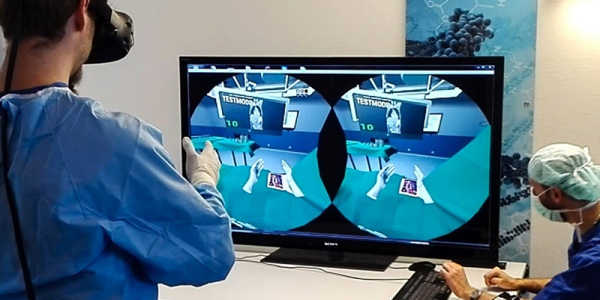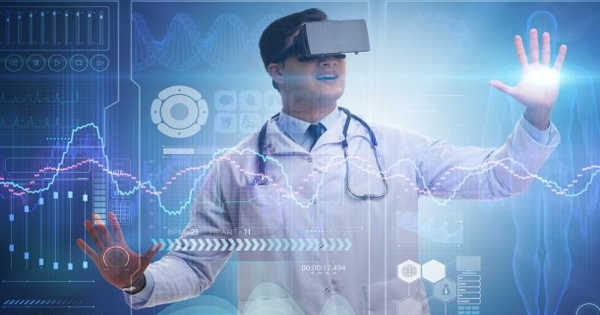With significant input from the University of Huddersfield, a new report that could help improve how immersive technologies such as Virtual Reality (VR) and Augmented Reality (AR) are used in healthcare education and training has been published.
Professor David Peebles, Director of the University’s Centre for Cognition and Neuroscience, and Huddersfield Ph.D. graduate Matthew Pears contributed to the report ‘Immersive technologies in healthcare training and education: Three principles for progress,’ which was recently published by the University of Leeds and included input from a variety of academics, technologists, and health professionals.
The principles were further developed in a letter to the prestigious journal BMJ Simulation and Technology Enhanced Learning. The Huddersfield contribution to the report stems from several years of research by another former Huddersfield Ph.D. researcher, Yeshwanth Pulijala, and Professor Eunice Ma, who is now at Falmouth University.
A new report could help improve how immersive technologies such as Virtual Reality (VR) and Augmented Reality (AR) are used in healthcare education and training.
“Yeshwanth was interested in technology and education, as well as using virtual reality for dentistry training. Matthew was interested in soft skills and situation awareness, which could be used to investigate how dentists kept track of what was going on around them. They were related subjects, albeit with different emphasizes, and it seemed like a natural area for collaboration.”
The University of Leeds published a report titled ‘Immersive technologies in healthcare training and education: Three Principles for Progress,’ which included input from a variety of academics, technologists, and health professionals. The study advocates for greater standardization of how immersive technologies are used in healthcare training and education.
With only a small number of dental schools in the UK, the quartet traveled to India in early 2017 to test their VR-based training materials on students, with the help of Santander Bank travel grants. The experience gained from that visit aided both researchers’ PhDs and eventually led to Professor Peebles’s and Matthew Pears’ involvement in the new report.

The report advocates for more standardization of how immersive technologies are used in healthcare training and education. “It’s about developing a set of principles and guidelines for the use of immersive technology in medical treatment,” explains Professor Peebles. Immersive technology is gaining popularity, and as the technology advances, it becomes clear that there is significant potential to make training more accessible and effective.
“It is critical, however, that research is driven by user needs and existing evidence rather than technology.” Rather than thinking, “We have a new piece of VR or AR kit, what can we do with it?” we should consider the problem at hand: what are the learning needs, and how can we use technology to address them?
“Creating immersive training materials can take a long time and be difficult to evaluate properly. It is difficult to persuade surgeons and medical students to test your VR training. In our case, we were fortunate to have a surgeon, Professor Ashraf Ayoub, a Professor of Oral and Maxillofacial Surgery at the University of Glasgow, who agreed to let us film a surgical procedure, which was then transformed into a 3D environment to teach students about situation awareness in the operating room.”
Professor Peebles hopes that the work so far will serve as a foundation for future research that will help maximize the potential of VR and immersive technology.
“It’s difficult to conduct these kinds of studies well, especially when it comes to gathering enough quantitative data to rigorously evaluate them.” “As the report suggests, more collaboration is needed to pool technological and intellectual resources, to try to develop a set of standards, and to build a community that works together to boost and improve research in this area.”
Future research
Professor Peebles hopes the work so far will provide a basis for future investigations to help utilize VR and immersive technology to its full potential. Conducting these kinds of studies is difficult to do well, in particular getting sufficient quantitative data that allows you to rigorously evaluate them.
“As the report recommends, more collaboration is required to pool technological and intellectual resources, to try to develop a set of standards and a community that works together to boost and improve research in this area,” Professor Peebles added.
















